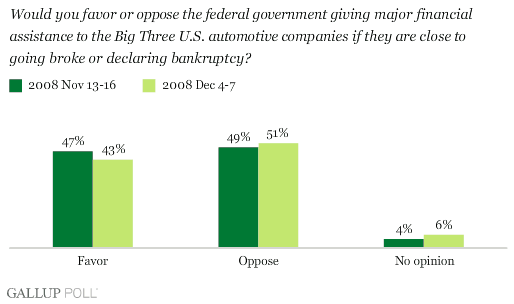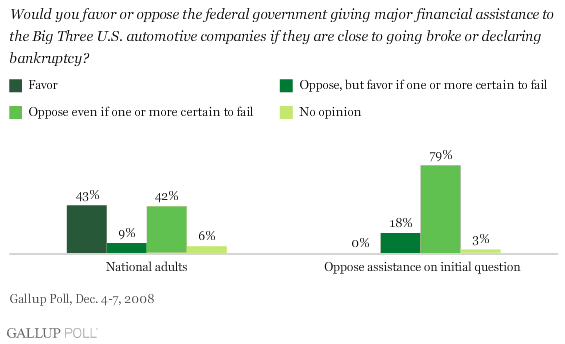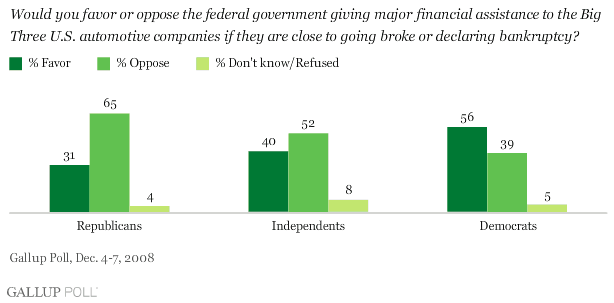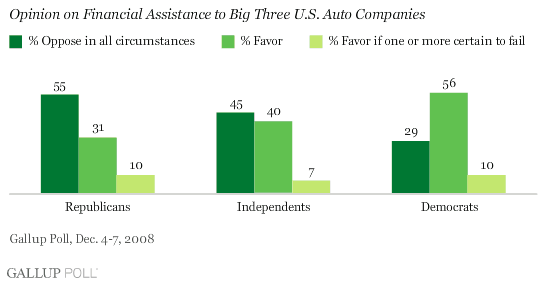PRINCETON, NJ -- A slight majority of 51% of Americans say they oppose the federal government's giving major financial assistance to the Big Three U.S. automotive companies, while 43% favor it -- representing a slight decrease in support compared to three weeks ago. However, if it is stressed that one of the Big Three companies were certain to fail without government assistance, support rises to the majority level of 52% and opposition falls to 42%.

The responses to these questions, as was the case three weeks ago when they were first asked, show an American public essentially giving mixed signals on what Congress should do in regard to the auto industry crisis.
The basic question on the auto industry bailout is as follows:
Would you favor or oppose the federal government giving major financial assistance to the Big Three U.S. automotive companies if they are close to going broke or declaring bankruptcy?
The 43% of Americans who say they favor major assistance marks a slight decrease in support for the bailout from Gallup's Nov. 13-16 poll (47%). Meanwhile, there has been a slight, two-point increase in the percentage who are opposed, from 49% last month to 51% currently. This notable lack of movement to the more positive side of the ledger suggests that the recent testimony of auto executives on Capitol Hill and the case they made for needing assistance was not effective in moving public opinion.
Support for federal assistance rises when the respondents who say they are opposed are presented with a scenario under which one or more of the three major U.S. automotive companies were certain to fail without the assistance. Given this follow-up, 18% of those initially opposed shift their views to the "support" column, leaving the overall distribution of opinion showing a slight majority approval.

There are differences -- in fact, highly significant differences -- in views of the bailout by the partisan orientation of respondents.
On the basic question of the bailout, almost two-thirds of Republicans are opposed, while 56% of Democrats are in favor. Independents tilt toward opposing the bailout.

Some Republicans who were initially opposed shift to the "favor" side of the ledger when probed for their views if one of the "Big Three" were certain to fail, but even with that, 55% of Republicans remain opposed.

(By way of comparison, a question asked in a Dec. 1-2 CNN/Opinion Research poll was phrased as follows: "The major U.S. auto companies have asked the government for a program that would provide them with several billion dollars in assistance. The auto companies say they may go into bankruptcy without that assistance. Based on what you have read or heard, do you favor or oppose this program?"
The results showed that 36% of Americans favored assistance, with 61% opposing it. This is a significantly more negative response than to either of the ���۴�ýPoll surveys on the issue. The most likely explanation for the difference is question wording. The CNN/Opinion Research poll began by stating that the "major U.S. auto companies have asked the government for a program that would provide them with several billion dollars in assistance." The ���۴�ýquestion more directly asks respondents if they favor or oppose "the federal government giving major financial assistance to the Big Three U.S. automotive companies." The CNN question mentioned "billions" while the ���۴�ýquestion did not specify a dollar amount beyond "major financial assistance." Both questions did remind respondents that the companies were in danger of going into bankruptcy.)
Implications
There is no groundswell of support from the American people in favor of congressional approval of a massive loan or bailout for the automobile industry. If anything, support has dropped slightly over the last several weeks, even as automobile executives have been testifying on Capitol Hill, and Congress now seems close to voting on a scaled-down measure. If it is made clear that one or more of the auto companies would fail without government assistance, a bare majority of Americans would favor it, but this is hardly a ringing endorsement.
Because the decision on an auto industry bailout will ultimately be made in the context of a political congressional environment in Washington, it is important to note that bailout support is highly divided by partisanship across the country. Republicans oppose it, while Democrats favor it.
Survey Methods
Results are based on telephone interviews with 1,009 national adults, aged 18 and older, conducted Dec. 4-7, 2008. For results based on the total sample of national adults, one can say with 95% confidence that the margin of sampling error is ±3 percentage points.
Interviews are conducted with respondents on land-line telephones (for respondents with a land-line telephone) and cellular phones (for respondents who are cell-phone only).
In addition to sampling error, question wording and practical difficulties in conducting surveys can introduce error or bias into the findings of public opinion polls.
